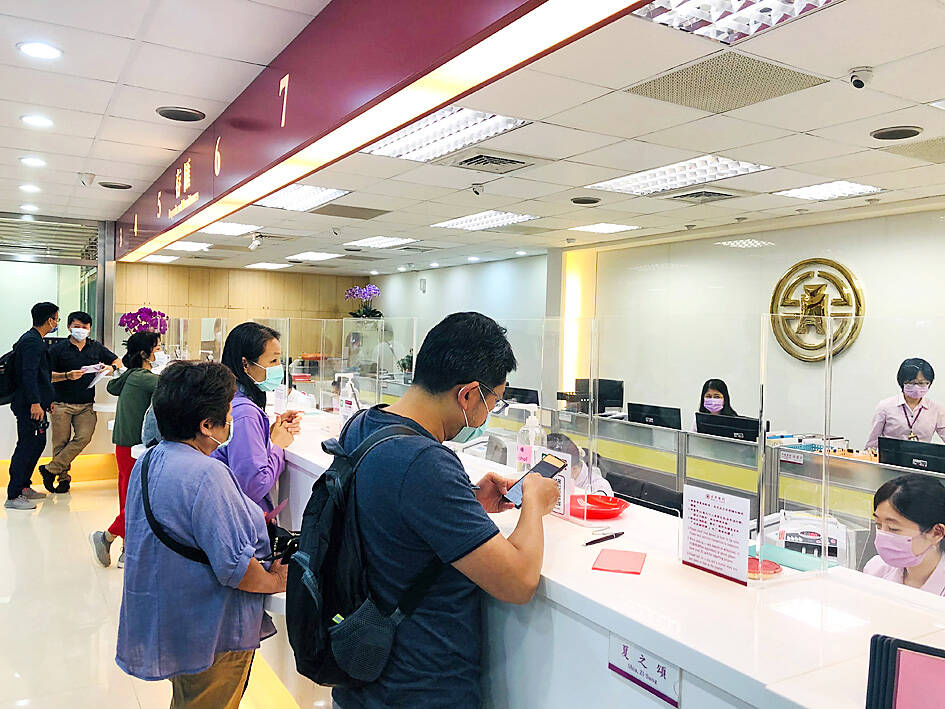Banks were the only segment in the local financial sector that reported growth in pretax profit from Jan. 1 to Aug. 31, thanks to the central bank’s rate hikes, the Financial Supervisory Commission said on Thursday.
Banks in Taiwan reported a combined pretax profit of NT$291.32 billion (US$9.2 billion) in the first eight months of the year, up 7.1 percent annually, as rate hikes drove up interest income, commission data showed.
Taiwanese banks’ pretax profit grew 9.3 percent from a year earlier to NT$267.3 billion in the eight months, the highest for the period on record, while credit co-operatives’ pretax profit rose 12.6 percent to NT$2.64 billion, commission data showed.

Photo: Kelson Wang, Taipei Times
However, foreign banks’ local units saw pretax profit drop 11 percent to NT$9.88 billion, as funding costs increased amid widening interest spreads between the US and Taiwan, the commission said.
Securities companies’ combined pretax profit decreased 59.19 percent to NT$35.62 billion in the first eight months, as fee income was dented by declining turnover in the local stock markets, the data showed.
Meanwhile, futures companies’ pretax profit dropped 0.7 percent to NT$3.43 billion, and investment trust firms’ pretax profit fell 9.76 percent to NT$9.39 billion, as investors became conservative about investments, the commission said.
Securities and Futures Bureau Deputy Director Kao Ching-ping (高晶萍) said the turnover in local stock markets shrank by NT$29.76 trillion in the first eight months after the TAIEX fell by 3,123.4 points during the period, causing the brokerage and proprietary trading businesses to see their income reduce by NT$37.86 billion and NT$30.67 billion respectively.
As for the investment trust firms, their asset management business declined to NT$4.76 trillion over the eight months, compared with NT$4.84 trillion in the same period last year, which affected fund managers’ fee income, Kao said.
Life insurance companies’ combined pretax profit dropped 22 percent to NT$264.3 billion, as investment income plunged amid market routs and rate hikes worldwide, while non-life insurance companies reported combined net losses of NT$76.5 billion due to sizable payments to COVID-19 insurance policyholders, the data showed.
Overall, financial companies in Taiwan reported a combined pretax profit decline of 27.7 percent year-on-year to NT$527.56 billion in the first eight months, the commission said.

The DBS Foundation yesterday announced the launch of two flagship programs, “Silver Motion” and “Happier Caregiver, Healthier Seniors,” in partnership with CCILU Ltd, Hondao Senior Citizens’ Welfare Foundation and the Garden of Hope Foundation to help Taiwan face the challenges of a rapidly aging population. The foundation said it would invest S$4.91 million (US$3.8 million) over three years to foster inclusion and resilience in an aging society. “Aging may bring challenges, but it also brings opportunities. With many Asian markets rapidly becoming super-aged, the DBS Foundation is working with a regional ecosystem of like-minded partners across the private, public and people sectors

BREAKTHROUGH TECH: Powertech expects its fan-out PLP system to become mainstream, saying it can offer three-times greater production throughput Chip packaging service provider Powertech Technology Inc (力成科技) plans to more than double its capital expenditures next year to more than NT$40 billion (US$1.31 billion) as demand for its new panel-level packaging (PLP) technology, primarily used in chips for artificial intelligence (AI) applications, has greatly exceeded what it can supply. A significant portion of the budget, about US$1 billion, would be earmarked for fan-out PLP technology, Powertech told investors yesterday. Its heavy investment in fan-out PLP technology over the past 10 years is expected to bear fruit in 2027 after the technology enters volume production, it said, adding that the tech would

Taiwan Semiconductor Manufacturing Co (TSMC, 台積電) has secured three construction permits for its plan to build a state-of-the-art A14 wafer fab in Taichung, and is likely to start construction soon, the Central Taiwan Science Park Bureau said yesterday. Speaking with CNA, Wang Chun-chieh (王俊傑), deputy director general of the science park bureau, said the world’s largest contract chipmaker has received three construction permits — one to build a fab to roll out sophisticated chips, another to build a central utility plant to provide water and electricity for the facility and the other to build three office buildings. With the three permits, TSMC

YEAR-END BOOST: The holiday shopping season in the US and Europe, combined with rising demand for AI applications, is expected to drive exports to a new high, the NDC said Taiwan’s business climate monitor improved last month, transitioning from steady growth for the first time in five months, as robust global demand for artificial intelligence (AI) products and new iPhone shipments boosted exports and corporate sales, the National Development Council (NDC) said yesterday. The council uses a five-color system to measure the nation’s economic state, with “green” indicating steady growth, “red” suggesting a boom and “blue” reflecting a recession. “Yellow-red” and “yellow-blue” suggest a transition to a stronger or weaker condition. The total score of the monitor’s composite index rose to 35 points from a revised 31 in August, ending a four-month